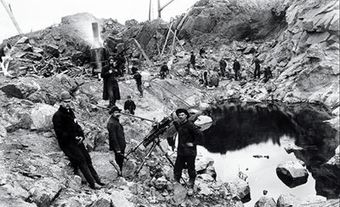Tungsten
Tungsten (W), also called Wolfram, lapis ponderosus or Heavy Stone, is a silver-grey metallic element with the highest melting point of any metal (3410° C). Tungsten has a high density, high strength at elevated temperatures and extreme hardness. Its first important use, during the mid-1800s, was in the manufacture of high-speed steel. Tungsten steels are important to industry because they retain their hardness and strength at high temperatures. Sintered tungsten-carbide tools were developed in the 1920s, and account for about 60% of current tungsten consumption. Metallic tungsten is used in the electronics industry and for lightbulb filaments.
There are 4 important ore minerals of tungsten: scheelite, wolframite, ferberite and huebnerite, the first 2 being far more abundant than the others. Canada was a major producer of tungsten ore and concentrate until 1986, when increased exports from the People's Republic of China caused a price collapse that eventually forced Canadian mining operations to close. In light of recent price increases some deposits are being re-evaluated and may be brought back to production. Canada's largest tungsten deposits are located in the YT, the NWT (where there is a community named for the metal) and NB; smaller deposits are dispersed across the country.
Most Canadian production of tungsten contained in ore and concentrate is exported to the US and western Europe. Canadian production of tungsten concentrate accounted for 20% of the tungsten concentrate traded on the world markets in the first half of the 1980s. There is also a relatively large domestic tungsten-carbide tool industry based on imported tungsten. The metalworking and petroleum industries are the major users of tungsten-carbide tools. Presently, the world's major producers of tungsten are the People's Republic of China, Russia, Bolivia, Thailand, Uganda, Peru, the Republic of Korea and Brazil.

 Share on Facebook
Share on Facebook Share on X
Share on X Share by Email
Share by Email Share on Google Classroom
Share on Google Classroom

